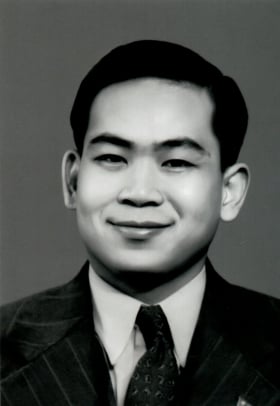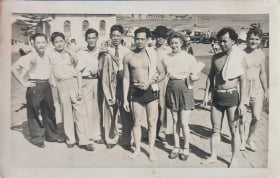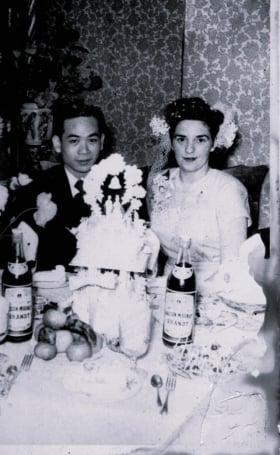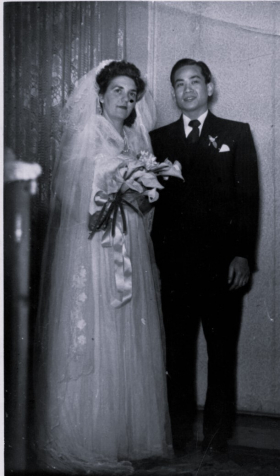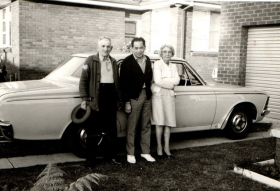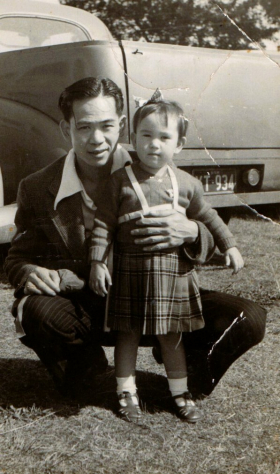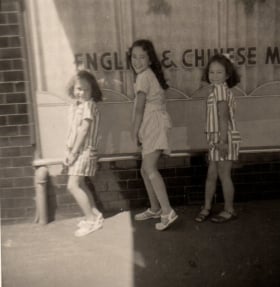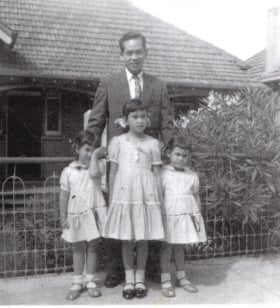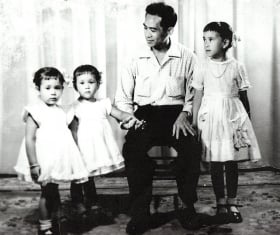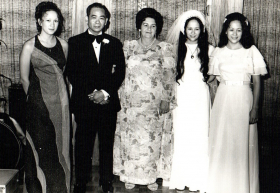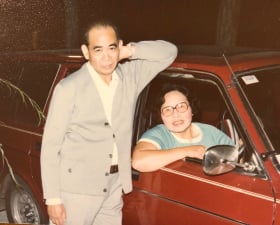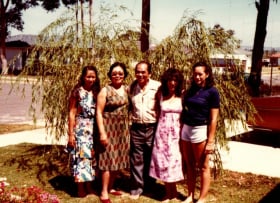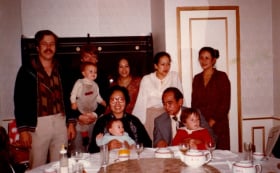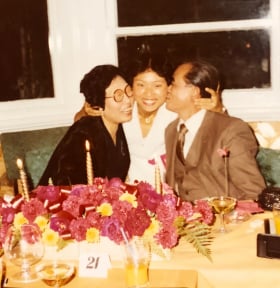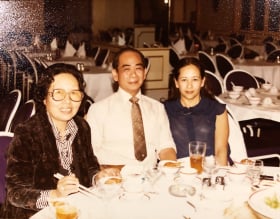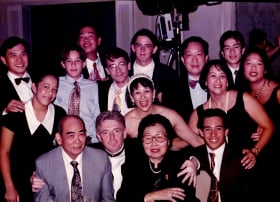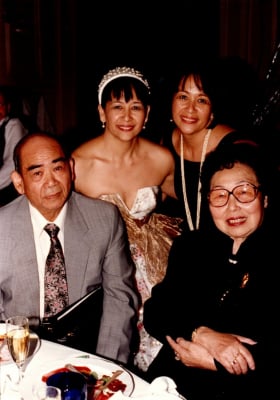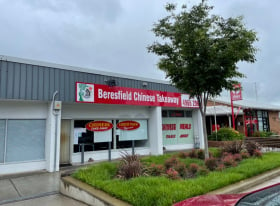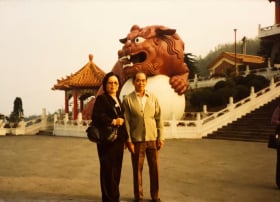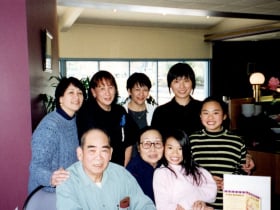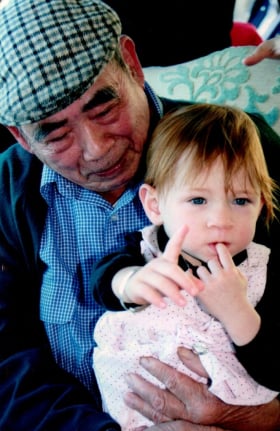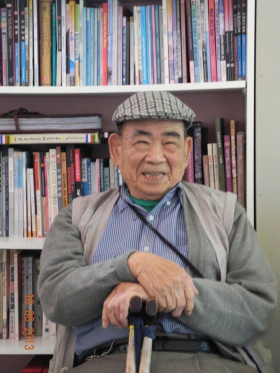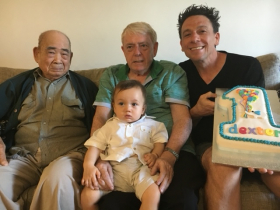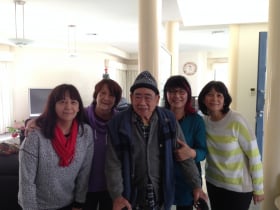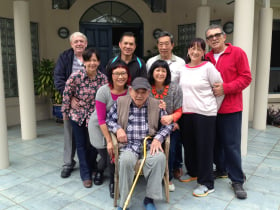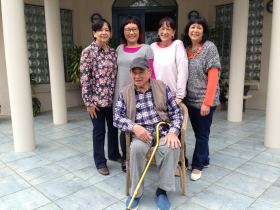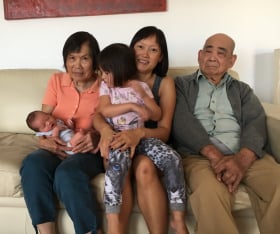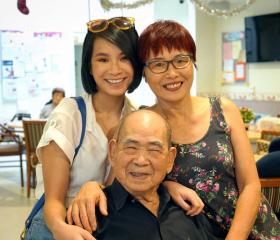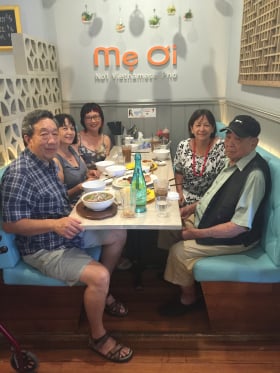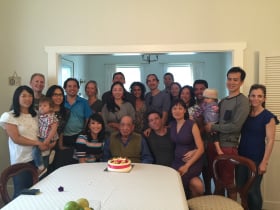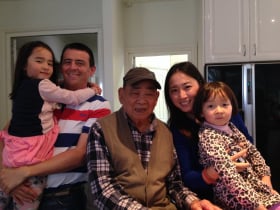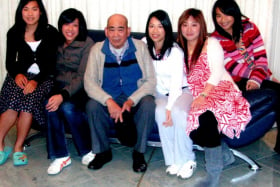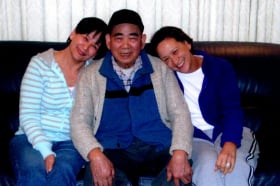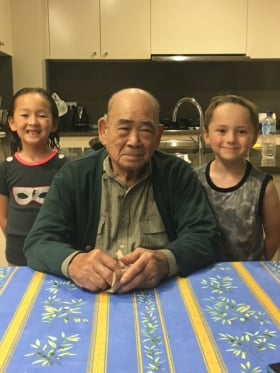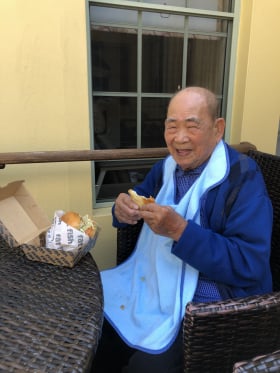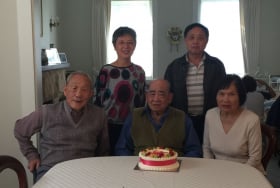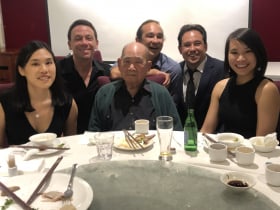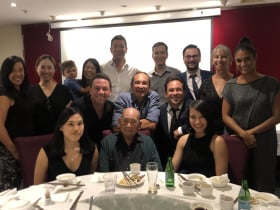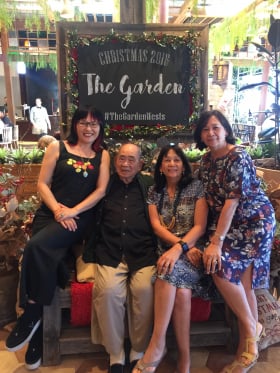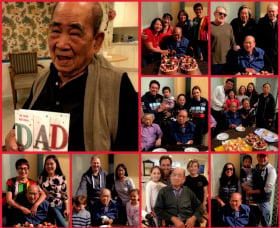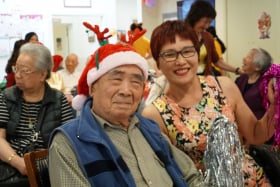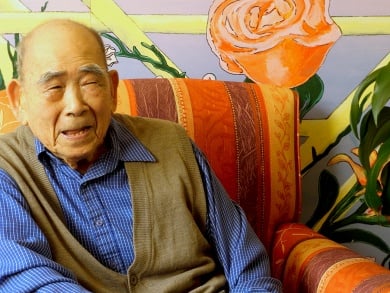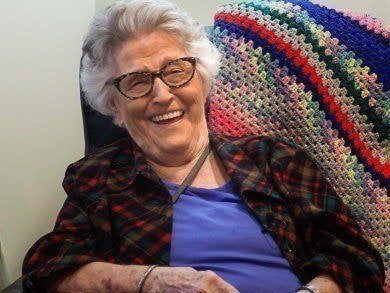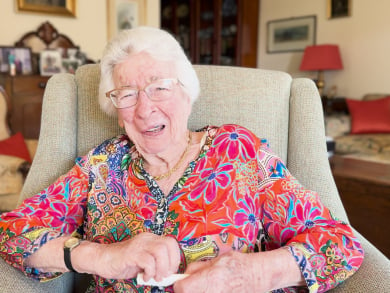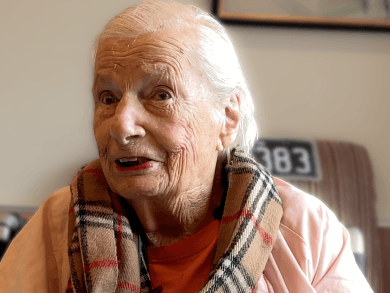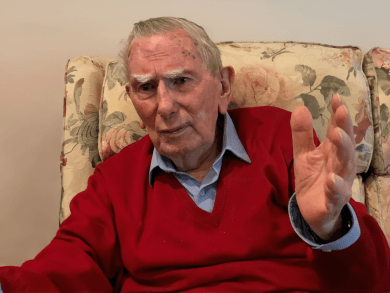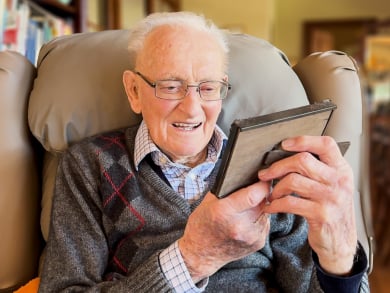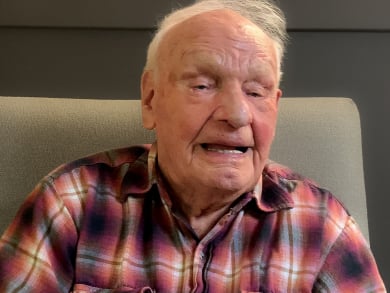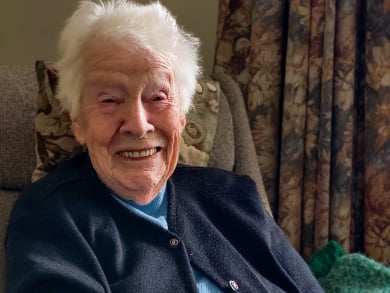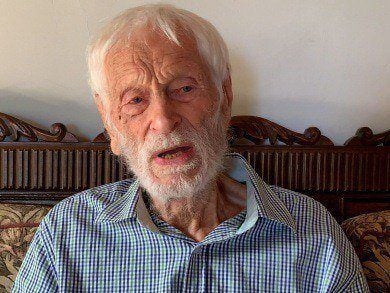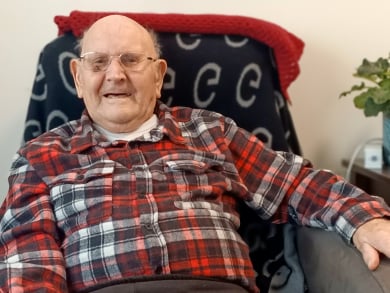Closed captioned icon
View audio transcription
My name is Kevin Tong, and I was born in Guangzhou,
but from the city, not the country side.
Do you want to know about my life
in Guangzhou when I was a kid?
The impression is very vague;
My father sold porridge at night,
and my mother wove mats,
which are now not popular.
It is a straw mat used for resting feet.
When I was a kid,
I had nothing to do except study,
I studied in Guangzhou for two years,
until I was 16 years old;
I went to the private school in Guangzhou,
not the public school.
When we went to school,
we could wear whatever we like,
there was no specific school uniform.
School fee was required. That's it.
I’d already seen motor cars on the street.
Unfortunately I didn't have a car at the time.
Because my sister who was married to a guy
whose brother was a foreman of the
wooden boxes factory in Hong Kong.
It was he who took me to Hong Kong.
My job was to make wooden boxes.
And those wooden boxes were used for
loading and transporting to other ports or towns.
but when I was in Hong Kong,
all of them were Chinese working over there,
all Chinese, except for those
senior officers who were British,
As time went on, after three years later,
the Imperial Japanese army
came to invade Hong Kong.
I met the Japanese for less than ten
days before I returned to Guangzhou.
Because they said there was no food in
Hong Kong and told us not to stay in Hong Kong.
Unless for those who were born in Hong Kong,
then we could still stay in Hong Kong.
For the people who came
from other provinces,
they had to return to their
original provinces.
So everyone went back to their provinces,
and not many people left in Hong Kong.
For those who were still in Hong Kong,
who had to suffer for
“Three years and eight months”,
and there were incidents of cannibalism.
After I returned to Guangzhou,
I became a hawker, selling on the street.
One day I went shopping.
And at that time,
Japan was invading Australia.
Therefore, the Japanese government needed
a lot of manpower to help with logistics.
That’s why they stopped
passers-by on the street.
If they were young,
the Japanese army would threaten them
with guns and forced them to get into their car,
but if they refused, they may be stabbed
to death by the Japanese army's guns
so that they had no choice but obey.
That was how I got in the truck
and went to their internment camp.
We got on the boat at night and I didn't
know how many days it took to reach New Guinea.
We heard that we would need to stay in
New Guinea,
but I was not really sure whether
this was true or not.
And the Japanese army would
send us to work.
And I was sent to take care of
four Japanese people
who were in charge of radio engineering.
My responsibility was to carry water
and cook for them.
I did not assist the Japanese
army in logistics.
More than a year later, the Japanese army encountered
difficulties in logistics,
and the fact that Australia invited
the United States to assist
and the Japanese army was unable to deal with
Australia due to lack of manpower,
and they decided to retreat.
But I was ill and walked slowly,
unable to keep up with the retreat of the Japanese,
and even if some were behind,
they didn’t care at all.
Gradually I fell to the back of the troop,
and I walked alone for two nights
without seeing anyone.
Of course there was fear,
but I had no other way.
I felt hungry so I was wondering where
to find something to eat?
Fortunately, I saw a
pomegranate tree in front of me,
and I wanted to pick pomegranates.
Although the pomegranates
were still unripe and still yellow,
I would eat them to feed myself.
Suddenly, Australian soldiers
pointed a gun at me,
they yelled at me, when I turned around
and saw that they pointed a gun at me,
and I immediately held my hands up.
They searched me and ensure
no weapon with me.
I was sent to the Liverpool Internment Camp
by Australian soldiers.
There were Australian soldiers guarding us,
because there were not
too many Chinese there.
When I was in the internment camp in Australia, we did the gardening. We worked in the farm during the daytime,
and at about 4 or 5 o'clock,
we went back to the internment camp.
We cooked and had dinner by ourselves,
and they just didn’t care about us at all.
Even though we finished dinner, we couldn’t leave
the camp or we had to be trapped inside.
In there we were surrounded by mesh everywhere.
Later, the Australian soldiers felt that it was not worth having a dozen or so Chinese here,
because they had to send troops to guard us.
So I was released,
and went to the Immigration Office,
took a photo and got a permit to work,
and we were able to go out and find work.
At that time Chinatown was
very shabby and not crowded.
I didn't live in Chinatown.
Where I lived was far from Chinatown.
I just lived in East Sydney.
When I first came to Australia,
the old Chinese here told us
that they would often have eggs
and tomatoes thrown at them on the street.
Australian didn't care about Chinese
in barber shops,
they wouldn't do haircuts for them, even though they sat in the shop all day, the barbers just ignored them.
At the time I got a job working in a
dry-cleaning shop, including ironing clothes.
I earned five and a half pounds
each week.
Later I quit my job at the dry-cleaning shop
and worked in a restaurant.
In the restaurant, I learnt
to stir-fry and later became a cook.
At that time, the restaurant was very busy,
but there were not many Chinese serving.
Most of the waitresses were Aussie.
That's how I met an Aussie girl.
During the day, we worked together,
and at night, we went to the theatre to
watch movies and learnt to dance together.
The dancing fee was only two cents,
which was quite cheap.
At that time, I didn't know English yet,
but I only knew a few English words,
because I didn't need to speak English at all.
But I just knew how to say,
"I love you", and that would be enough.
After I was with her, she was pregnant,
and we got married.
Later, a property agent told me
that there was a property,
It was a cafe with just enough room
to put a few small tables and stools.
We bought it and the two of us ran a business
together and lived upstairs.
Later, our twins girls were born, I believe it was
because my wife's grandfather was also a twin.
She inherited from him.
Now, I have four daughters in total,
and three of them are my own daughters.
Later, when I went out to work,
she saw in the newspaper
that there was a restaurant for sale
far away, so I went there to have a look.
My wife really liked the restaurant, so I
sold my house and gave her all the money to buy it,
and finally it opened.
It was in Ballina, near Queensland.
The happiest time for me was
when I first became a father,
owned my car, and owned my business.
Life was good, business was quite good,
and there was a good income every week.
Those days were my happiest time.
More than a year later, one day, she told me,
not to go for a swim with the kids the following day.
She wanted me to take the girls to the tailor to make an outfit for
her friend's banquet. But unfortunately, I forgot.
Instead, I took my daughters to the beach
and then I went back to work,
When my wife woke up she asked me,
“Where were our daughters?”
I replied that “they went swimming”.
She said, “Didn't I tell you last night
not to take them swimming?”
I told her that I really forgot, but she said
I was doing it on purpose.
“Bring our daughters back immediately
and leave! No more working here!”
She also said that “this is my business. In
my name. Not yours!”
There's nothing I could do about it.
So I left and I gave her
20 dollars a month to support our children.
A few years later, I met a Chinese lady who
was my workmate in a restaurant and we fell in love.
At that time the restaurant was in Coffs Harbour,
and then we all went to Newcastle together,
because she heard that there was
a take-away for sale.
She proposed that we buy the business
and we paid 20 pounds each,
and owned the business together.
The business gradually got busier,
then we also bought a house.
I was thinking that since we had our own
business and our own house already,
we might as well get married.
This was my second marriage.
Both of us were almost 50 years old.
We just accompanied each other.
I really went to work in a lot of restaurants.
Lin Chang, Nanjing, Niangxiangya, Xinxing,
and Huayuan. All have since closed.
I think the best time was when
I retired when I was 66 years old.
When I retired that year,
gardening was my favorite activity.
I love potted plants the most,
like bonsai. I enjoyed it so much.
And I acquired my wealth and owned a car,
and those days were my happiest moments.
My wife passed away.
It's been ten years now.
Today, it is not just me who lives a long life,
but many people are the same.
Why? The reason is that medical
treatments have improved a lot,
and many diseases can be cured,
whereas they could not be cured before.
Therefore, many people can live
longer and longer.
Do I want to live a long life?
Actually, I don't want to.
It’s because I feel that my movement
is very slow,
and I am inflexible when I raise my
hands and my mobility has decreased.
So getting older makes me think, “Why am I here?”
But I am still here!
Thanks To
Rima Chan, Joey Tso, Management of Bernard Chan Nursing Home, Lifestyle Department, Australian Nursing Home Foundation
Kevin Tong
"I didn't speak English... but I knew how to say 'I love you' and that was enough!"
The surprising story of a 100 year old Australian Chinese immigrant
Detained by the Japanese in WWII and then by the Australians, Kevin Tong’s story is an extraordinary immigrant experience. Kevin Tong’s story starts in Guangzhou, China, but after he was forcibly taken to work for the Japanese in New Guinea during World War 2, he was detained by the Australian Army. His life in Australia might have started in an internment camp but he worked hard to create a full and rewarding life.
Age in Video
102 yearsDate of Birth
2nd May 1920Place of Birth
Guangzhou, ChinaThanks To
Rima Chan, Joey Tso, Management of Bernard Chan Nursing Home, Lifestyle Department, Australian Nursing Home Foundation
